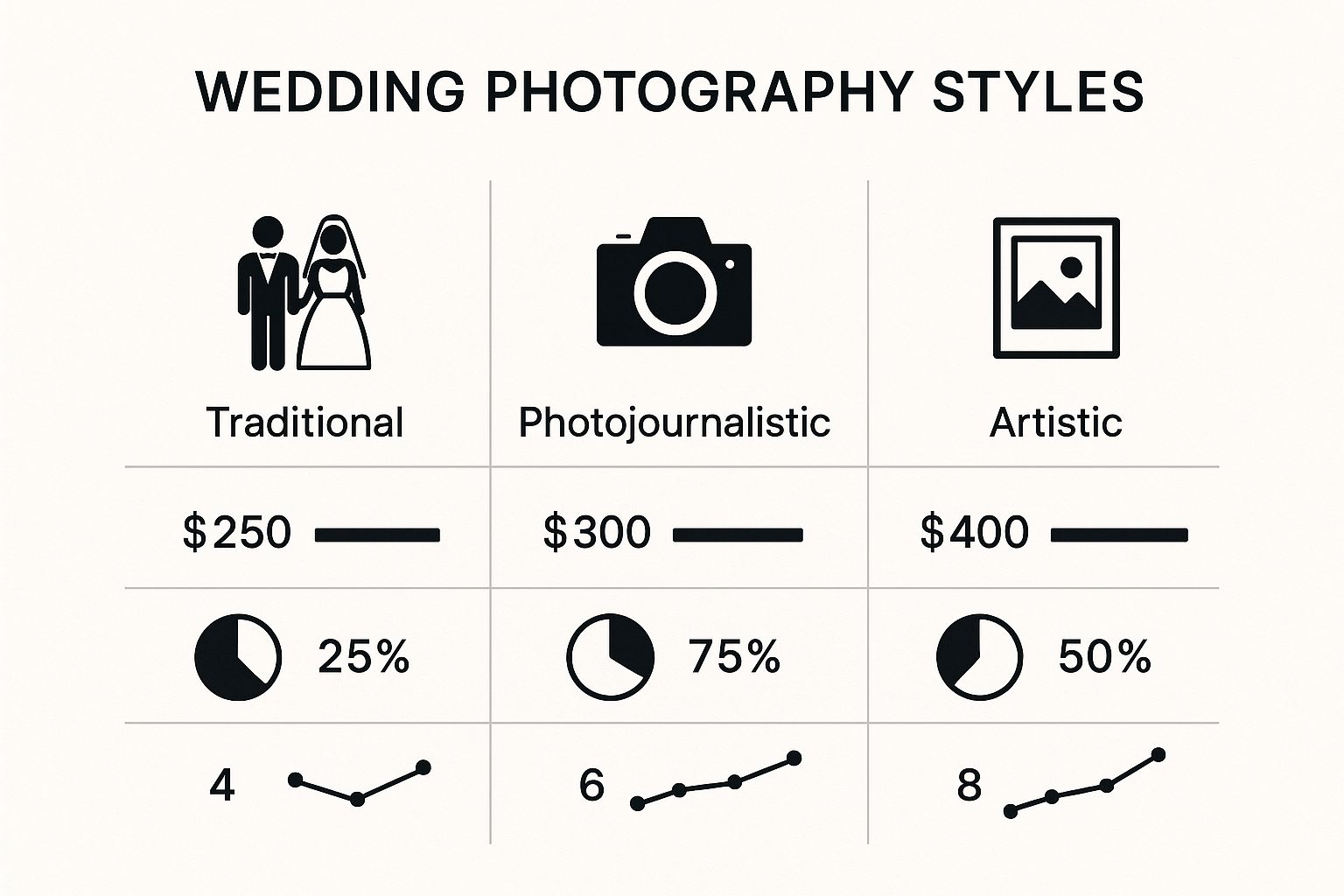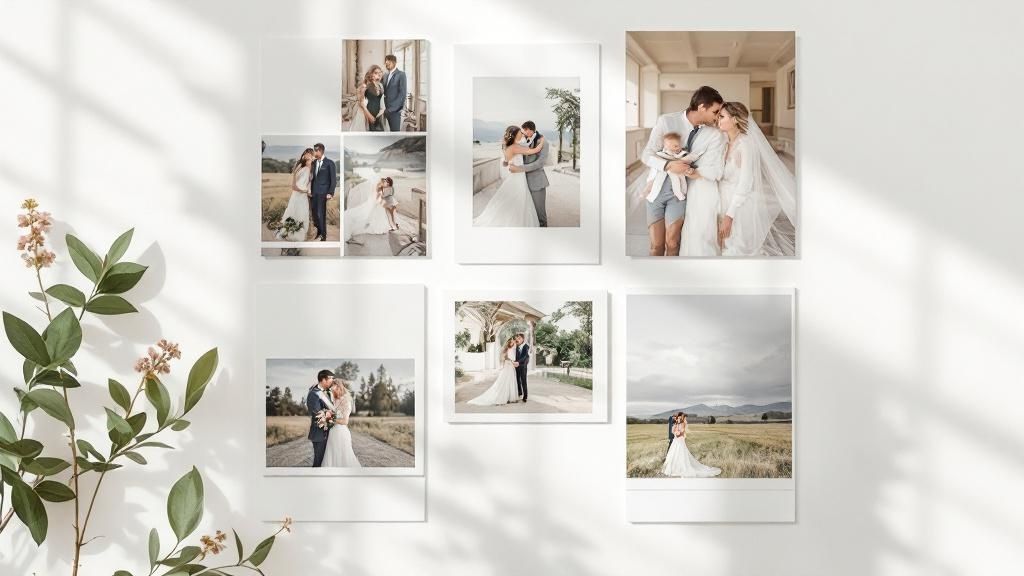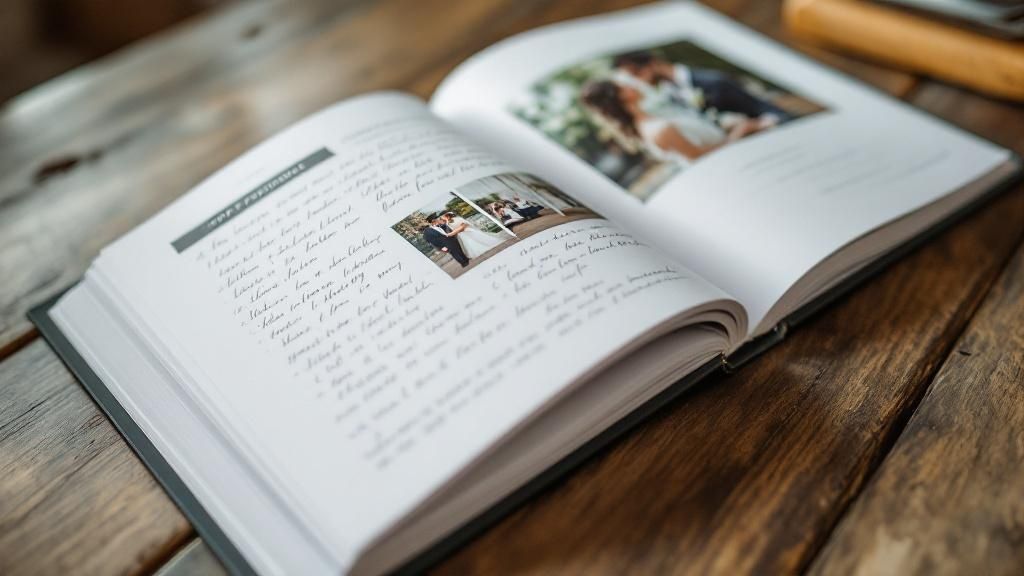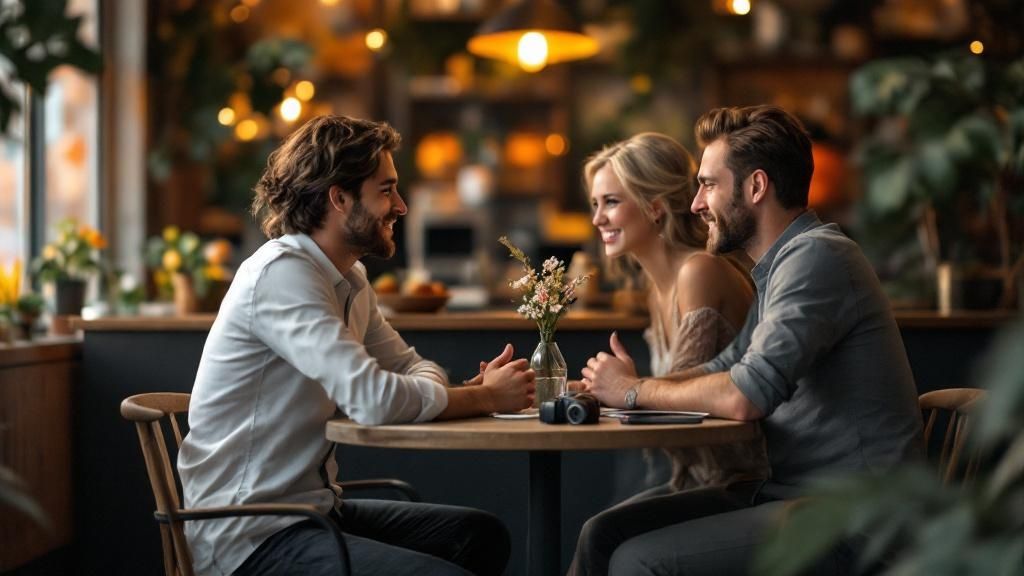Before you even start looking at prices or packages, let's talk about what really matters: finding a photographer whose style you absolutely love and whose personality makes you feel comfortable. The very first step is figuring out what kind of photos make your heart skip a beat. Are you drawn to bright, dreamy images, or do you prefer something dark and dramatic? Nailing this down will make your entire search so much easier.
First, Let’s Talk About Your Vibe
Forget spreadsheets and inquiry emails for a minute. The real starting point for choosing a wedding photographer is all about the feel. When you're flipping through your wedding album in 10, 20, or even 50 years, how do you want those photos to transport you back to the day?
Think of your photos as more than just pictures; they're the physical keepsakes of all the emotion and energy of your wedding. Once you identify an aesthetic that feels like you, it becomes your North Star, guiding you through the rest of the process and making the search genuinely exciting.
Finding a Style That Tells Your Story
Most photographers have a signature style, even if they mix a few different techniques. Getting familiar with the main categories will help you put a name to what you're looking for when you start reaching out.
Here’s a quick rundown of some popular styles:
- Photojournalistic (or Documentary): This is all about capturing the day as it happens—no interruptions, no forced poses. The photographer is like a ninja, sneaking around to catch all the candid laughs, happy tears, and spontaneous dance moves. It’s pure storytelling.
- Fine Art (or Light & Airy): If you're dreaming of photos that look like they belong in a magazine, this is it. This style is known for its soft light, pastel colors, and carefully composed shots. It’s incredibly romantic and has a polished, almost ethereal quality.
- Traditional (or Classic): Think of your parents' wedding album. This style focuses on the timeless, posed portraits of you, your family, and your wedding party all looking at the camera. It’s classic for a reason and guarantees you get all those essential keepsake shots.
Of course, a lot of modern photographers are creating a bold and moody look, playing with deep shadows and rich, saturated colors to craft images that are dramatic and full of emotion. The atmosphere you create at your venue can play a huge role in this, too. For example, some creative wedding uplighting ideas can provide the perfect backdrop for a photographer who thrives on drama and contrast.
To help you visualize what these styles look and feel like, here's a quick comparison.
A Quick Look at Wedding Photography Styles
Use this comparison to pinpoint the photography style that best aligns with your vision for the big day.
| Style | What It Feels Like | Best For Couples Who… |
|---|---|---|
| Photojournalistic | Spontaneous, authentic, and in-the-moment. Like a beautifully captured story. | …want to remember the day exactly as it happened, with all its candid emotions. |
| Fine Art | Romantic, dreamy, and intentionally beautiful. Every shot feels like a work of art. | …love a soft, polished, and editorial look with meticulous attention to detail. |
| Moody & Dramatic | Cinematic, emotional, and rich. Uses shadows and deep colors to create intensity. | …crave artistic, non-traditional photos that feel powerful and full of passion. |
| Traditional | Classic, timeless, and formal. A collection of essential, posed portraits. | …value formal group photos and want to ensure every key person is captured perfectly. |
Ultimately, this is about finding an artist who sees the world the way you do. Once you know what you’re looking for, you’ll be ready to dive into portfolios with confidence.
Choosing a photographer is so much more than a quick scroll through their Instagram. It’s about understanding these different artistic approaches and really digging into their work. Pinpointing your preferred style is the most important thing you can do before you even start your search.
The image below gives you a sense of how different these styles can be.

As you can see, the style you pick doesn't just affect how your photos look—it can also influence things like cost and how long you'll wait to get your gallery back. But once you know the vibe you’re going for, you're officially ready to start the fun part: finding the perfect artist to capture your day.
Setting a Realistic Wedding Photography Budget

Alright, let's talk numbers. When you're trying to figure out how to choose a wedding photographer, the budget conversation is unavoidable. And honestly, it’s one of the most critical investments for your big day. Try to think of it less as a cost and more as safeguarding your memories for a lifetime.
That price tag isn't just for someone to show up with a nice camera. A photographer's fee is a bundle of their expertise, thousands of dollars in professional gear (plus backups!), insurance, editing software, and the countless hours they'll pour into your photos long after the party's over.
There's a reason this is such a booming field. The global wedding photography market is on track to be worth over $45 billion by 2033, a testament to how much couples value getting amazing, professional shots. You can dig into the specifics in this wedding photography services report. This growth means you have more options, but it also shows that getting this decision right is a top priority for many.
What Goes Into the Price Tag
So, what are you actually paying for? A few key things influence what a photographer charges, and knowing them helps you understand the value behind the numbers. It’s about way more than just the hours they’re with you on the day.
Here are the main factors that shape the cost:
- Experience & Reputation: A photographer with years under their belt, a killer portfolio, and glowing reviews is going to be a bigger investment than someone just starting out. You're paying for their proven skill and the peace of mind that comes with it.
- Hours of Coverage: This is a big one. A package that only covers your ceremony and a few portraits will be much more affordable than all-day coverage, from getting ready in the morning to your grand exit.
- Your Location: It’s a simple fact of business. Photographers in major cities with a higher cost of living will generally have higher rates than those based in smaller towns.
- What's in the Package: Are you getting an engagement shoot? A second photographer? A beautiful album or credit toward prints? All these extras add value and will affect the final price.
Expert Tip: The goal isn't to find the cheapest photographer. It's about finding the best value. That means finding an incredible artist whose work you love, who you click with personally, and whose packages fit comfortably within your overall wedding budget.
Making Sense of Photography Packages
Once you start asking for quotes, you’ll see packages of all shapes and sizes. A more basic one might offer six hours with a single photographer. A premium collection could include ten hours, a second shooter, and a high-end wedding album.
Having a second shooter, by the way, is amazing for capturing both of your reactions during the ceremony and getting way more candid shots of your guests having a blast.
Think about what really matters to you. Do you want the complete story of your day, or are you happy with just the main events? Knowing this will make comparing packages so much easier.
And don't forget how much the little details matter! Your photographer can only capture what's there, and great reception lighting can elevate your photos from good to absolutely stunning. You can get some inspiration from these top dance floor lighting ideas to give your photographer the perfect canvas to work with.
Alright, you’ve narrowed down your list. You've found a few photographers whose work gives you butterflies and whose prices don't make you want to elope. Now for the most important part: the deep dive.
Choosing your wedding photographer is so much more than just loving their Instagram feed. It’s about finding a true professional who can handle the beautiful, unscripted, and sometimes chaotic reality of a wedding day.
A polished website showing off stunning sunset portraits is one thing. But what you really need to know is how they perform when the pressure is on. This is where you’ll separate the seasoned experts from the talented weekend warriors.
Look Beyond the Highlight Reel
Here’s the single most important thing you can do: ask to see a few full wedding galleries. Seriously, don't be bashful about this. Any photographer worth their salt will be proud to share their work from start to finish.
Why is this so critical? Because a highlight reel is just that—the best of the best, cherry-picked from dozens of different weddings. A full gallery tells the real story.
When you're clicking through a complete wedding, you're looking for answers a "best-of" gallery just can't give you:
- How do they handle tricky lighting? Look at the difference between the bright, sunny ceremony shots and the photos from the dark, moody reception hall. Is the quality consistent? Or do the dance floor pictures look like a grainy, blurry mess?
- Are the family portraits actually good? Do people look relaxed and genuinely happy, or are they stiff, awkward, and squinting into the sun? This is a test of both technical skill and people management.
- Do they capture the real moments? Beyond the big stuff, look for the in-between moments: guests roaring with laughter, a quiet tear shed by a parent, the little decor details you agonized over.
This is your only chance to see if their magic holds up from the first mimosa to the final sparkler exit. If you see a major dip in quality after sunset, that’s a huge red flag.
Spotting the Green Flags (and the Red Ones)
As you dig in, you’ll start to see patterns. You'll get a gut feeling about who is a reliable pro and who might be a bit of a gamble. Trust that feeling, and pay attention to these signs.
Green Flags to Look For:
- They happily send over full galleries, no questions asked. This screams confidence.
- Their communication is on point. They respond to your emails in a timely manner and answer your questions without being vague.
- They have a backup plan. And I mean for everything—gear failure, illness, a car breaking down. This is non-negotiable.
- Their reviews are stellar. Look for reviews that mention more than just "pretty pictures." Do past clients talk about how calm and professional they were on the big day?
A pro photographer's value isn't just in their creativity. It’s in their ability to be a calming force, to anticipate moments before they happen, and to solve problems you didn't even know you had—all while creating incredible art.
On the flip side, some red flags can be subtle. Be cautious if a photographer gets defensive about sharing full galleries or is super slow to get back to you. An incomplete or missing contract is an immediate deal-breaker.
Vetting your photographer is a lot like vetting your other creative partners. Just as you'd come prepared with a list of questions for your DJ, you need to do your homework here. In fact, many of the same principles apply, as you can see in this guide on what to ask a potential wedding DJ. Your goal is to build a vendor team you can trust implicitly, so you can just relax and enjoy your day.
What to Ask a Wedding Photographer Before You Book Them

Alright, this is the final hurdle. You’ve narrowed down your list, and now it’s time to chat, whether it's over coffee, a video call, or in their studio. This isn’t just about logistics; it’s a vibe check.
Think about it: this person will be glued to your side for 8-10 hours on one of the most emotional days of your life. Feeling a real, comfortable connection with them is just as important as loving their portfolio. You want their presence to add to your day, not make it feel awkward.
Your goal is to move past the price sheet. This conversation is your chance to really understand how they work under pressure and to make sure their personality is a great fit for you, your partner, and your families.
Digging Into Their Style and On-the-Day Approach
First things first, let's talk creative philosophy. You need to know how they capture a wedding day, not just what the final photos look like. Their answers here will tell you everything you need to know about whether their style meshes with the atmosphere you're planning.
Here are a few questions I always recommend starting with:
- "How would you describe your energy on a wedding day? Are you a quiet observer, or do you get right in there to direct people and pose shots?" This is huge. It helps you figure out if you're hiring a fly-on-the-wall documentarian or an art director.
- "Let's say it starts pouring rain unexpectedly. Walk me through your game plan." A seasoned pro will light up—they'll have stories about dramatic umbrella shots and creative indoor solutions. A less experienced photographer might panic. This question reveals their ability to think on their feet.
- "What’s your take on capturing the small, in-between moments versus the big, scheduled ones?" This tells you if they prioritize the candid laughs and tears or if their main focus is hitting the major beats like the first kiss and cake cutting.
A great photographer doesn't just take pictures; they anticipate moments. They have a sixth sense for when a heartfelt glance or a tearful hug is about to happen, and they're ready to capture it without being intrusive.
Talking Logistics and Technical Stuff
Once you’re feeling good about their creative side, it’s time to get down to brass tacks. These questions are designed to prevent any "I wish we'd known…" moments later on. No surprises!
For example, understanding their technical skills is crucial. Asking something like, "How do you handle lighting for a dark reception hall?" is a fantastic litmus test. An expert will immediately start talking about using off-camera flash to create beautiful, dynamic light. If their only answer is "I'll just crank up the ISO," that can be a red flag.
Don’t leave the meeting without asking these essentials:
- What does your full backup plan include? This isn’t just about gear. Ask about backup cameras, extra memory cards, and—most importantly—what happens if they get sick. A true professional will have a network of trusted colleagues they can call on.
- When will we get our full gallery of photos back? Get a firm timeline, not just a vague "soon." The industry standard can range anywhere from 4 to 12 weeks, so you need to know their specific turnaround time.
- What are our rights to the photos? Can we print them wherever we want and post them on social media? Don't assume. Clarify the usage rights so you know exactly what you can and can't do with your own wedding pictures.
- Will you be the person actually shooting our wedding? This is a big one. Some larger studios use associate photographers. You need to confirm that the person you're building a rapport with is the one who will be there on the day.
This interview is your ultimate gut check. If you walk away feeling excited, understood, and totally confident in their skills, you've probably found the one.
Time to Talk Contracts: What You Absolutely Need to Know

Okay, I get it. Reading a contract is probably the least romantic part of wedding planning. But trust me on this one—it's one of the most critical steps you'll take. A detailed, professional contract isn't about mistrust; it’s your safety net. It’s all about creating crystal-clear expectations for both you and your photographer.
The biggest mistake I see couples make is signing a vague or incomplete contract. This isn't just a piece of paper; it's a legal document that should leave zero room for guesswork. You need to know exactly what’s happening before, during, and long after the wedding day.
The Non-Negotiables in Every Contract
Before you even think about signing, you need to know what a solid photography contract should contain. Every pro will have their own version, but there are some non-negotiable elements that absolutely must be there and spelled out clearly.
Make sure your photographer’s contract explicitly covers:
- Names and Dates: Your full names, the photographer’s name, and the specific date, time, and addresses for your wedding ceremony and reception.
- Coverage Details: Exactly how many hours of coverage are included. A defined start and end time is crucial.
- Final Deliverables: What are you actually getting? How many edited images? Are they high-resolution? Do you get a print release to make your own prints?
- Total Cost and Payment Schedule: The full price, broken down to show any travel fees or taxes. It should also clearly state the retainer amount and when the final balance is due.
A truly great contract is the mark of a seasoned professional. It shows they've thought through every possible scenario and are dedicated to being transparent. Honestly, it's a massive green flag.
Understanding the Fine Print
Now, let's get into the nitty-gritty. Beyond the basics, a few specific clauses need your undivided attention. These are the areas where misunderstandings pop up, so it's vital you read them carefully. For example, with so many couples planning destination or outdoor weddings, the contract needs to address travel plans and what happens if the weather goes sideways.
Dig in and make sure you fully understand these key sections:
- Cancellation Policy: What happens if you have to postpone or cancel? And just as important, what if they have to cancel? The terms for refunds, rescheduling, and retainers must be spelled out.
- Image Rights and Usage: This part defines who can do what with the photos. Typically, the photographer keeps the copyright (they own the image), but they grant you a license for personal use. This means you can print them, post them on social media, and share them with family.
- Post-Production Timeline: This is a big one. When do you get to see your photos? A pro will give you a specific timeframe, like "delivery within 8-12 weeks of the wedding date," not a vague promise of "soon."
- The "What If" Plan: This is absolutely essential. The contract must outline what happens if your photographer has a medical emergency or some other unforeseen crisis. It should detail their plan to provide a suitable replacement photographer of equal skill and style.
Making sure you understand these terms is just as important as figuring out the cost of a wedding videographer; both are huge investments. A clear, thorough contract means you can sign on the dotted line feeling completely confident and secure.
Still Have Questions? Let's Talk It Out
Feeling a little overwhelmed by all the choices? Don't worry, that's completely normal. Choosing the person who will capture your wedding day is a huge decision. I've been doing this for a long time, and I've heard just about every question in the book. Let's tackle some of the most common ones that pop up.
How Far in Advance Should I Lock in My Photographer?
Honestly, the sooner, the better. For the best selection of talent, you should really aim to book your photographer 9-12 months before your wedding day. This is especially true if you’re planning a Saturday wedding during the busy season (think late spring through early fall).
I've seen top-tier photographers get booked solid 18 months or more in advance. Once you have your date and your venue, your photographer should be next on the list. The good ones get snapped up fast!
Is a Second Photographer Really Necessary?
This is a great question. A second photographer is a brilliant move for larger weddings—anything over 100-150 guests—or if your logistics are complex, like having separate getting-ready locations or a tight timeline.
Think about it: one photographer can focus on you walking down the aisle while the second captures your partner's reaction. Or while you’re off taking portraits, the second shooter can be getting amazing candids of your guests enjoying cocktail hour. For smaller, more intimate affairs, one amazing photographer is often all you need. The best thing to do is just talk it through with them; they’ll tell you straight up what your specific day needs.
What if my photographer gets sick? This is a critical point. A pro’s contract should always have a contingency plan. It needs to clearly state that if they can't make it, they will provide a replacement photographer of a similar skill level and style from their professional network. This clause isn't just a nice-to-have; it's your peace of mind.
What's the Real Difference Between "Edited" and "Retouched" Photos?
So many couples get tripped up on this, and it’s super important to understand before you sign a contract. They sound similar, but they are worlds apart.
- Editing is the base-level magic. This is where every single photo you receive gets adjusted for things like color balance, exposure, and contrast. It's what gives the entire gallery that consistent, signature style you fell in love with.
- Retouching is the detailed, "up-close" work. This is a much more hands-on process, done on a photo-by-photo basis. We're talking about removing a distracting exit sign, smoothing skin, or whitening teeth. This is almost always an extra service you can purchase for specific images.
Be sure you know exactly what’s included in your package. A quick chat about this can prevent a lot of confusion down the road.
Are There Any Other Cool Ways to Capture the Day?
Absolutely! Standard photos are essential, but there are so many creative avenues to explore now. Couples are always looking for that "wow" factor, and one of the biggest trends is getting a completely different perspective.
For instance, have you thought about aerial shots? Some photography teams and venues now offer this. You can learn more about how drone wedding photography can add an epic, cinematic scope to your wedding album and video. It's definitely worth asking potential photographers if this is something they offer or if they have trusted partners they work with. Never be afraid to ask what's possible beyond the standard offerings!
At 1021 Events, we specialize in creating unforgettable wedding experiences with professional DJ/MC services, stunning uplighting, and expert photography and videography. We're dedicated to making your special day seamless and memorable. Learn how we can bring your vision to life.

